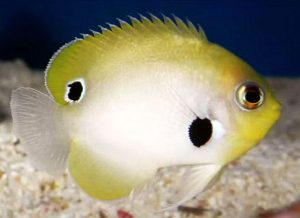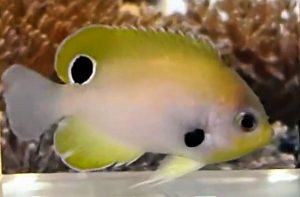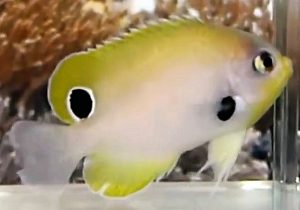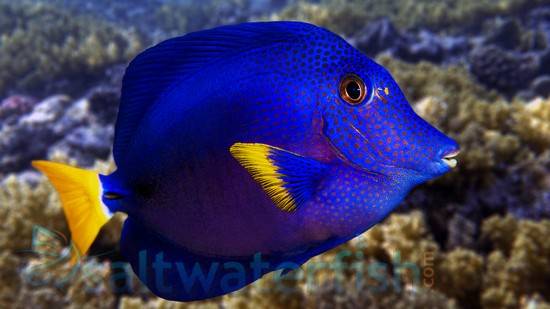The Blackspot Pygmy Angelfish (Centropyge nigriocella) known to tropical fish keeping enthusiasts as the Blackspot Angelfish, Black Spot Angelfish, and Ocellated Angelfish ranges from the Admiralty Islands, Caroline Island, Central Pacific, Wallis Island in French Polynesia, Guam, Johnston Atoll, Fanning Island in Kiribati, Loyalty Islands, New Caledonia, Northern Mariana Islands, Papua New Guinea, Samoa, the Society Islands, and various United States Minor Outlying Islands.
They have also been reported in scattered localities from Holmes Reef in the Coral Sea and the West Central Pacific at depths from 15 to over 50 feet.
Blackspot Pygmy Angelfish are an extremely rare species that frequently inhabit the clear lagoons and outer reefs of their range, usually around areas with a lot of rubble and dead corals where they graze on algae.
The Blackspot Pygmy Angelfish is a shy, reclusive, secretive, seldom seen species that has a pale yellow to almost white body color, with a large black spot that covers the base of the pectoral fin and a black, false black eye spot (ocellus) circled in white, on the rear part of the dorsal fin.
Blackspot Pygmy Angelfish are believed to be abundant in their range but because of their cryptic nature, seeing one is a matter of pure luck and capturing one would be like winning the lottery.
In the aquarium trade Centropyge nigriocella are even more rare and expensive than the deepwater Peppermint Angelfish (Paracentropyge boylei). To date only three specimens have been known to be collected alive, with the latest specimen from Vanuatu being the second one collected from that area.
Blackspot Pygmy Angelfish should be housed in a mature reef aquarium of at least 90 gallon capacity with plenty of live rock and dead corals arranged into caves, overhangs, and crannies for them to graze and hide among. Being a shallow water species, they can be housed with anthias, gobies, chromis, and other smaller non aggressive species. Because they live in a reef environment, pristine water quality is mandatory along with regular water changes.
Although nothing is known about the breeding habits of Centropyge nigriocella, they are believed to be egg scatterers and assumed to follow the same breeding habits.
Blackspot Pygmy Angelfish are omnivores that feed mainly on algae. In an aquarium environment they should be provided with a large quantity of mature live rock as well as feedings of Algae, Brine Shrimp, Frozen Foods, Mysis shrimp, and Angelfish formulas. Because they are grazers, they should be fed small portions at least 3 to 4 times daily.
Blackspot Pygmy Angelfish (Centropyge nigriocella) are extremely rare in the aquarium trade and exceedingly expensive when offered for sale. The last 1.7 inch specimen captured from Vanuatu was sold in Japan for a little over $16,000.00.
The reason some fish species fetch exorbitant prices is because of their isolation in distribution, the depths at which they live, or both. The reason Blackspot Pygmy Angelfish are so expensive is because they are so cryptic and rarely seen in their natural habitat. Capturing an elusive species this small is simply a matter of luck.
Minimum Tank Size: 90 gallons
Aquarium Type: Reef with rubble rock
Care Level: Moderate
Temperament: Peaceful
Aquarium Hardiness: Hardy when acclimated
Water Conditions: 77 °F – 82.4 °F, 8 to 12 dKH , pH 8.1 – 8.4, sg 1.020-1.025
Max. Size: 2.36″
Color Form: Yellow, Black
Diet: Omnivore
Compatibility: Single species; peaceful tankmates
Origin: Central Pacific
Family: Pomacanthidae
Lifespan: Unknown
Aquarist Experience Level: Advanced




